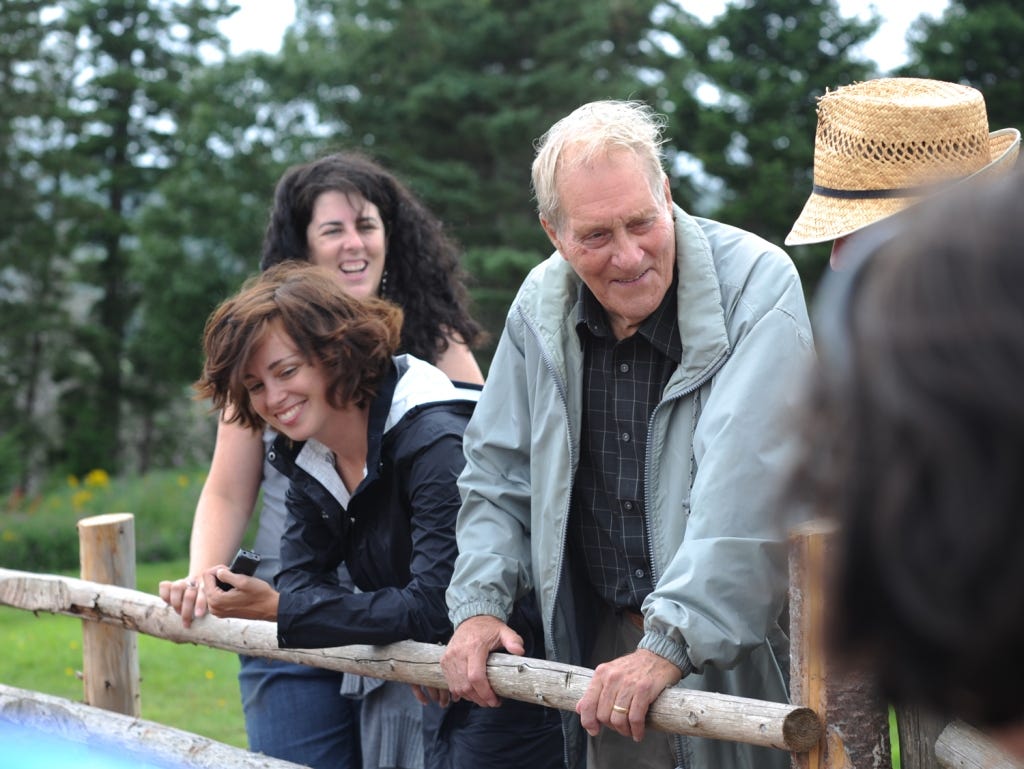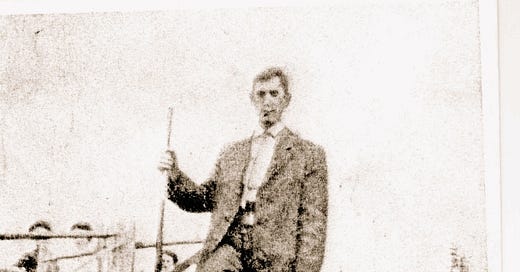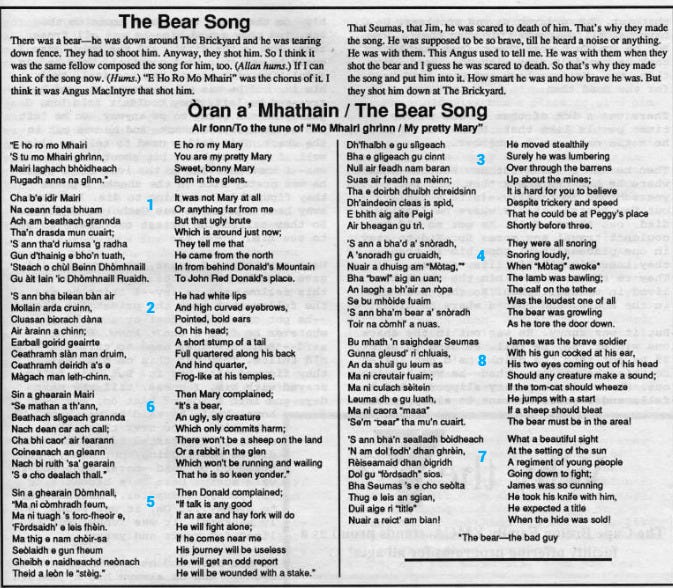Òran a' Mhathain | The Bear Song
Mary Jane shares family memories of an event which inspired a song by William MacVicar, sung by Allan MacLeod
Latha math dhuibh a chàirdean,
Tha sinn an dòchas gu bheil sibh gu frogail an Dihaoine seo | We hope you’re all feeling lively this Friday!
As part of our current project on the Cape Breton Gaelic Folklore Collection, we are writing biographies of the 156 tradition-bearers featured in the Collection and transcribing many of their recordings. We are sharing weekly posts on social media profiling these individuals, but this week’s feature on a song sung by Allan MacLeod warranted a longer post… Tha sinn an dòchas gun còrd e ribh!
Anns a’ bhrath seo | In this message:
Òran a’ Mhathain le Uilleam mac Ghilleasbuig, air a sheinn le Ailean mac Ruairidh Aonghais Dhòmhnaill Uilleim
Latha Eadar-nàiseanta nam Ban: boireannaich a’ chruinneachaidh
Froilig tar-sgrìobhaidh
Òran a’ Mhathain | The Bear Song
This week we feature one of the many ‘bear songs’ made in Nova Scotia, and one of several in the Cape Breton Gaelic Folklore Collection. In this case, it is a song composed by William MacVicar (Uilleam mac Ghilleasbuig) and sung by Allan MacLeod (Ailean mac Ruairidh Aonghais Dhòmhnaill Uilleim) about a bear that was wreaking havoc on the Brickyard Road, Mira. A group of men went out to tackle the problem, Mary Jane Lamond's grandfather among them.
Mary Jane shares some memories:
“Before I knew much about the Gaelic song tradition, I knew from family stories about the bear that had been shot because it was tearing down fences and killing the lambs and sheep. I heard that my grandfather and others went out to stop it.
I have a very fond memory of sitting with our grandfather in the sun porch at Mira when I was about 15 or 16 years old and looking at old photographs. When a picture of the bear came up he said, ‘That was before the war’, and then asked me ‘Which war was that?’ I knew that was a test and was savvy enough to take a moment and say ‘WWI?’ And I was rewarded with a big grin. He was tricky... a family trait.
As an adult, visiting my father’s first cousin, Florence MacIntyre, (a wonderful woman and younger half-sister to the Angus MacIntyre mentioned by Allan MacLeod in the introduction to the song below), she told me that the bear was shot during Communion week, which meant that there were hundreds of visitors to the area. As was the custom, her mother Christie, (my grandfather’s sister) had an extra barrel of flour and a barrel of pickled fish set aside for communion week. That was fine, but the bear had drawn so many visitors to the farm, all of whom had to have a bite to eat, of course, that she was afraid that she was going to have to dip into the stores set aside for the winter and insisted that the bear could no longer be on display.
My sister Susan did a some research on the names mentioned in the song and thinks that Màiri might be Mary Christina MacCuish, our grandfather's half-sister and Dòmhnall Iain Ruaidh maybe either Donald John MacCuish, his stepfather, or Donald John MacIntyre, Angus’ father. (There were a lot of Donald John’s). The Dòmhnall might be referring to our grandfather or any of the above!
I was thrilled when Allan told me about the song and sang it for me. Apart from my grandfather and Angus MacIntyre, he thought that there was a MacCuish fellow there and perhaps others.”

Allan MacLeod was raised in New Boston, Cape Breton Co., a community of immigrants from the isle of Lewis. He later settled in Catalone and worked as a carpenter at the Fortress of Louisbourg. Allan was a lovely person and a generous sharer of traditional knowledge and songs, many of which he learned from his father Ruairidh Aonghais Dhòmhnaill Uilleim. Allan recounted that his father’s singing was so popular that people would walk a great distance to hear him. Their house was often full of people of an evening and so they kept stumps and planks in the kitchen to make seating.
The bard William MacVicar was of North Uist descent and lived in Catalone. He was known as a prolific poet. Allan said that he had a wooden barrel full of songs in his house. Unfortunately, the house burnt down and many of his songs are lost now. A lot of his compositions were humorous and made on local events. His wit was so keen that if something embarrassing happened the people of the area would say, “Don't tell William” for fear that he would make a song about them.
William made a song about an old Model-T that belonged to Dan Lamond, “Dàn do Sheann Ford” (Song to an Old Ford). You can see Allan sing a lively version of it on An Drochaid Eadarainn.
This transcription and translation of the song (provided by Effie Rankin) was published in ‘Allan MacLeod: Stories and Gaelic Songs’ (Cape Breton's Magazine, Issue 74, p.83). When he sang the song for Dr John Shaw he gave the verses in a different order so we have put the numbers in to indicate that. The song can be heard on Srùth nan Gaidheal.
Latha Eadar-nàiseanta nam Ban: boireannaich a’ chruinneachaidh
On International Women’s Day last week (Friday March 8) we celebrated the 37 women in the Collection and their remarkable legacy. We have already put out posts on Facebook featuring sisters-in-law Flora MacLean (Flòraidh Bheag) and Margaret MacLean (Mairead Bean Ruairidh Iagain Ruairidh) and will feature all the others in due course.
Just now, we are trying to track down photos and stories of Isabel Fortune from Judique and Maggie Campbell from Glencoe (we believe she was born in 1888). If anyone is able to help us out, bhitheamaid ’n ur comain!
Froilig tar-sgrìobhaidh
A wee reminder that our next transcription frolic is on Monday 25 at 12 noon.
We will have more transcriptions and break-out rooms on the go to accommodate those who would like to work together as a group with conversation and discussion, and those who would like to listen on their own and transcribe into a collective Google Doc.
Follow this link for all the details. An dòchas gum faic sinn ann sibh!







